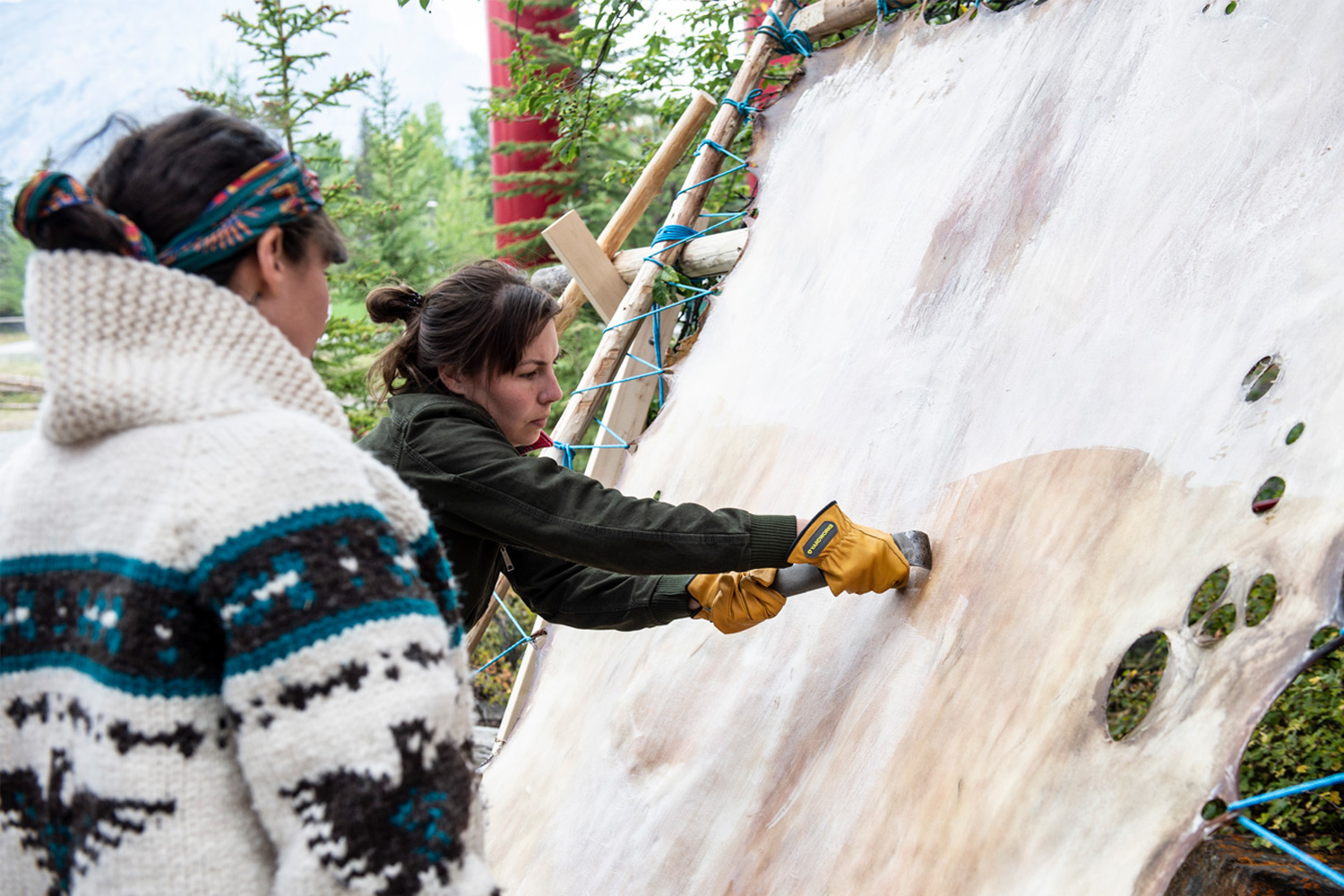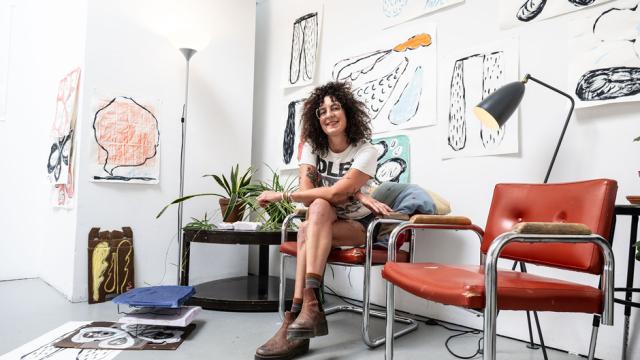Program Information
Overview
This three-week visual arts residency focuses on hide scraping, bone tool making, and working with parfleche. Visual artists who work with hide and parfleche will learn more about how scrape a hide, and work with parfleche with the support of faculty, elders, and knowledge keepers. Participants are invited to engage with faculty, community and peers while having self-directed studio time in Glyde Hall. Participants will come together with the community and have the opportunity for one-on-one sessions. The participants and faculty will have a chance to share their works in progress in Open Studios.
What does the program offer?
Participants will deepen their artistry and technical application with hide scraping, bone tool making, and working with parfleche. The program will foster peer relationships with the opportunity for self-directed studio time. Participants will also be engaged with community in storytelling/knowledge sharing sessions in the hide tanning process.
Who should apply?
This program welcomes Indigenous visual artists with traditional and/or contemporary arts practices interested in hide-tanning processes and working with parfleche. Applicants must be ages 18+ at the time of the program start date.
Itinerary
This three-week residency is a balance of self-directed time intermixed with support from faculty offering insight into the creative processes, and the opportunity for participants to workshop and present their work in a public event (film or reading), if desired. Peers are encouraged to collaborate through sharing their work.
Week One:
Participants will engage in on campus orientation and be welcome by Faculty, Banff Centre Staff and an Elder. This week will include Faculty presentations and a chance to sign up for one-on-one sessions with faculty.
Week Two:
Participants will begin with morning gatherings to welcome and say thank you to visiting faculty, as well as check in with needs and questions. This week will include participant presentations and one-on-one sessions.
Week Three:
Participants will begin with a welcome to new faculty, say thank you to guest faculty, and check in with needs and questions for the week. Faculty will offer one-on-one review sessions. Open Studios.
Faculty
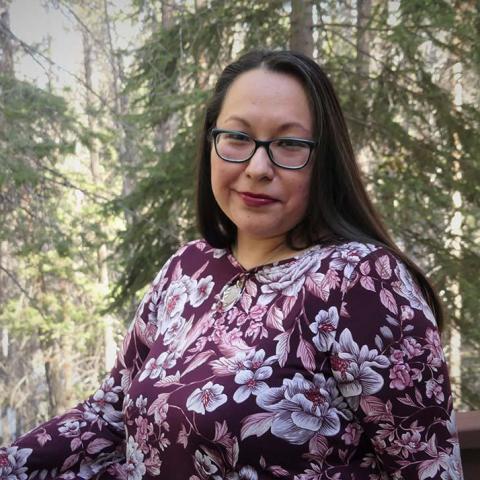
Janine Windolph
Janine Windolph (Atikamekw/Woodland Cree) is a Saskatchewan-based filmmaker, video editor, educator, fine-craft artist, and storyteller. She is the Director of Indigenous Arts at Banff Centre for Arts and Creativity. Prior, Janine was the Curator of Community Engagement at the MacKenzie Art Gallery in Regina, Saskatchewan. She has her Master of Fine Arts: Interdisciplinary in Indigenous Fine Art and Media Production.
Janine was a co-producer for RIIS Media Project Inc wherein she co-directed RIIS from Amnesia: Recovering the Lost Legacies (feature-length documentary) that features the history of the Regina Indian Industrial School (RIIS).
Janine’s filmography includes roles as producer, director, narrator, writer and/or editor. She directed Stories Are In Our Bones, Lifegivers: Honoring Our Elders and Children, The Land of Rock and Gold, Ayapiyâhk ôma niyanân “Only us, we are here at home,”
Janine is working with Buffalo Mountain Banff; a community group to Buffalo Mountain, and providing production support to the Buffalo Mountain Video Project that is part of her sons’ homeschooling.
Director of Indigenous Arts
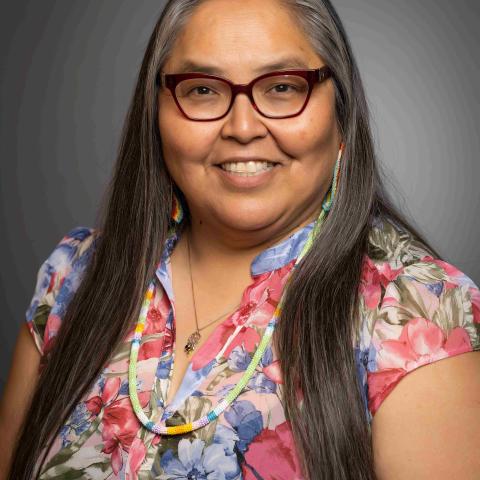
Joely BigEagle-Kequahtooway
Joely BigEagle-Kequahtooway
Joely BigEagle-Kequahtooway is an inter-disciplinary land-based buffalo artist. She is a fashion and textile designer, visual artist, beader, storyteller and co-founder of the Buffalo People Arts Institute. She is Nakota/Cree/Saulteaux from the White Bear First Nations - signatory to Treaty 4. She has degrees in Civil Engineering from the University of Calgary and Mathematics from the First Nations University of Canada. She is currently in the Master of Fine Arts program at the Institute of American Indian Art in Santa Fe, New Mexico. She loves to incorporate mathematics and geometry in her artwork and is inspired by the perfect symmetry in nature. Her mantra envelopes everything Tatanga (Buffalo) as it connects her to ancestral memories, the land and is the manifestational glue that keeps her world together.
Faculty
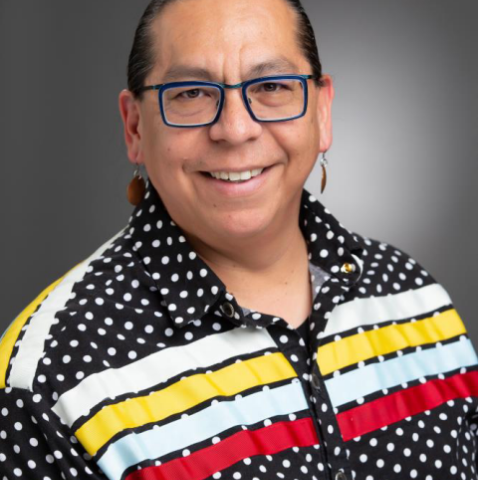
Lorne Kequahtooway
Originally from the Treay 4 area, Zagime Anishnabek, Lorne Kequahtooway is dedicated to sharing and preserving his culture with others in Saskatchewan. Lorne is co-founder of Buffalo Peoples Arts Institute where he currently teaches cultural awareness through storytelling and community engagement around an interactive buffalo hide-tanning experience.
Faculty
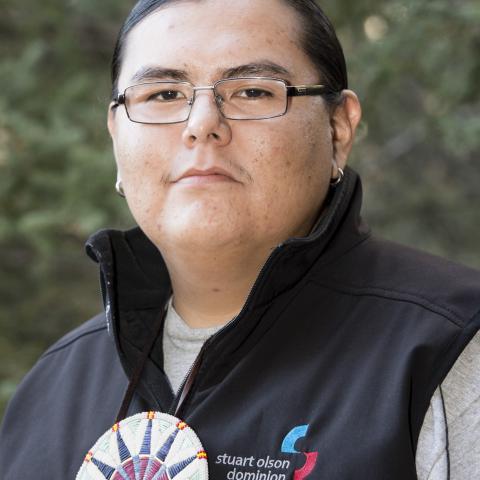
Daryl Kootenay
Daryl Kootenay is a young Indigenous leader, artist, entrepreneur, facilitator, educator, and mentor to many Indigenous and non-Indigenous youth in his community and surrounding communities of Stoney Nakoda Nation. Daryl is a father to 3 beautiful children Nakoda, Marazu, & Haske, and recently married to his now wife, Ariel.
Daryl is known for his international experience and work throughout Africa, Peru, Nicaragua, Mexico, England, France, Spain, Italy, America and Canada, and continues to work with young leaders across the globe on various projects relating to humanitarianism. His focus on Indigenous global issues sits along his work on local issues his community, and surrounding Indigenous and non-Indigenous nations and communities, are facing in the Southern Alberta region (also known as Treaty 7 Territory).
Daryl is a Stoney Nakoda Nation member through his mother’s heritage and is also from the Navajo Nation in New Mexico from his father’s heritage. Mr. Kootenay is a talented traditional artist and dancer, travelling across Turtle Island competing at many powwows and utilizing his regalia as teaching tools and methods.
Mr. Kootenay continues to utilize his traditional knowledge, art, dance and international experience to promote and educate people of all ages, with his experience in:
- Culture and identity
- Leadership development and wise practices
- Organizational leadership
- Project management
- Strategic planning
- Healthy relationships, partnerships and alliance-building
- Mental illness and overcoming stigma
- Individualism and volunteering
- Facilitating and public speaking
Daryl is the Co-executive Director of the Howl Experience, Owner of Bald Eagle Ltd., a Focal Point for the Global Indigenous Youth Caucus to the UN, Co-founder of the Nakoda Youth Council and a Co-convener of the Mni Ki Wakan Decade of Water Summit. Mr. Kootenay was recognized for his local, national and international work by the Governor General of Canada and was awarded Canada's Sovereign's Medal for Volunteers at the Rideau Hall, Ottawa.
Faculty
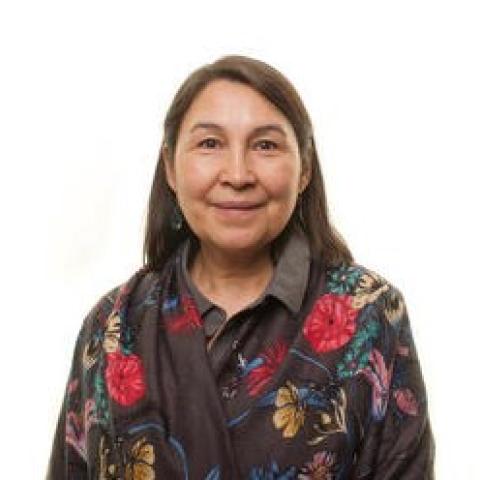
Lucy Yakeleya
Lucy Yakeleya was born and raised into the traditional ways in Fort Good Hope, Northwest Territories, as well as Colville Lake, NT. She spent several years in Residential School in Inuvik, NT. Lucy now lives and works in Yellowknife, NT. The distinct shapes, colours, patterns and small beads used in Lucy’s artwork reflect the influences she picked up from her family and from the Sahtu region. This is a family practice, as most of Lucy’s siblings are also involved in the arts in the Sahtu to this day. On her journey as an artist, Lucy sold her artwork to make extra income, which then gradually turned into a fulfilling hobby. While Lucy sells her art, she mainly loves to create pieces for herself and for her family. Through the years, Lucy has shared her skills with students in schools and has passed on the tradition of hide tanning at the Dene Nahjo camp. In 2019, Lucy shared her knowledge and skills as a faculty for Urban Moose Hide Tanning at Banff Centre for Arts and Creativity.
Faculty
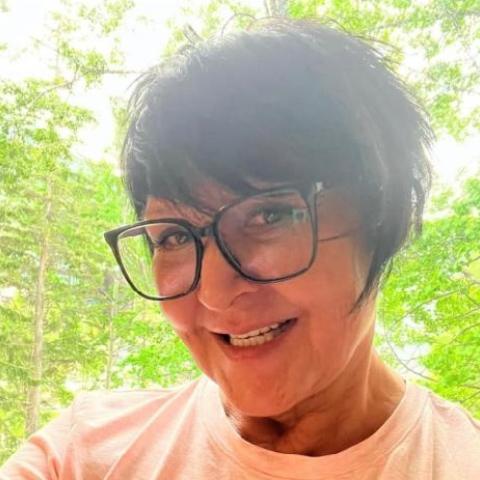
Suzan Marie
Suzan Marie is a Decesuline/Cree woman born and raised in the Northwest Territories. As a residential school survivor, Suzan has experienced firsthand the loss of culture and language that deeply impacted her life. In response, she is reclaiming her culture through being from a long line of traditional artisans. A traditional teacher keeping ancient Dene skills alive for over thirty years, Suzan co-authored two books, Whadoo tehmi / Long-ago people’s packsack Dene babiche bags: tradition and revival and Dene spruce root basketry / Dene ts’ukegáí tene rahesi: revival of a tradition, also referred to as the Dene suitcase and Dene pots and pans.
Suzan has taught across Canada and the US to all ages through what she calls reconciliation healing. She works with moose hair, porcupine quills, moose and caribou hooves, dentalium shell, angler, spruce-root, babiche bags, bone, beads, and embroidery using contemporary and traditional techniques. She sews earrings, caribou and moosehide mitts, and various styles of moccasins. In 2002, Suzan was the first recipient of the Queen Elizabeth II’s Golden Jubilee Medal for her commitment to keeping culture alive. A harvester of traditional materials and medicines, Suzan lives and breathes her culture. Suzan is also a mom and Setsune to her grandson Carver.
Faculty
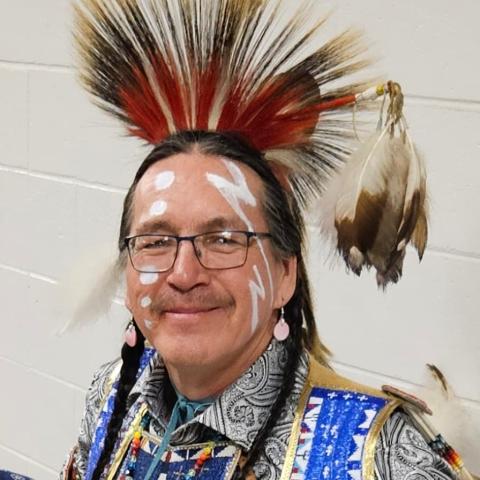
Gary Gott
Tansi. I am from the Treaty 4 lands of the Sapotaweyak Cree Nation. I was raised with the values of a family that fished, trapped and hunted from the land, and started learning hands-on from the age of 7 yrs. At the age of 19, in University I discovered traditional Indigenous spiritual ceremony and the world of powwow. I've been gifted to have been adopted and taught by families from various nations; Dakota, Lakota, Cheyenne, Plains Cree, etc. I've been beading for over 34 years to date, and have many examples scattered across North America. Recently I have concentrated on mastering the skills of Brain-tanning deer, elk, moose and buffalo hides. I also sing n dance powwow since 1989. I've seen an evolution as I've entered my mid 50s and continue to learn from all I meet.
Faculty Assistant
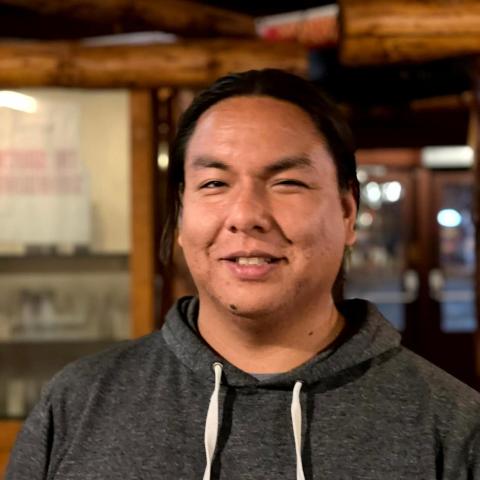
Wade BigEagle
Hello! My name is Wade BigEagle. I am from White Bear First Nations in Saskatchewan, Canada. I was raised by my mother Joely BigEagle, she took me to many places to experience my culture while growing up. I have been to many pow-wows and ceremonies that made me appreciate who I am and understand where my people come from. While my mother was learning the ways of the Buffalo, I only helped out a bit at first, I was too focused on my own journey. It was only until years later I had realized that her and my father Lorne Kequahtooway needed help with their Buffalo workshops. It has now been over two years since I have started helping, I have had many good experiences and lessons learned. I am very excited to continue this path and share my knowledge with my community and to those who want to learn. I am very proud doing what I do and extremely grateful for my mother, it is only the beginning of the new journey I am on.
Faculty Assistant
What's Included
Single or Shared Room
Read more
Close
When applying, choose between staying in a single or a shared bedroom on the Banff Centre campus for the duration of your program.
Get connected with other artists on campus and focus on your projects in a creative environment while we take care of the day-to-day essentials.
Full Flex Meal Plan
Read more
Close
Using a credit-based system to dine on campus, our flexible meal plans allow you to select meals according to your own needs during your stay. Banff Centre can accommodate most dietary requests.
The Full Flex meal plan is calculated at $70 credit per day, equivalent to breakfast, lunch and dinner at our Buffet service.
Showcase Your Work
Read more
Close
This program offers opportunities to showcase your work-in-progress in one of our performance venues.
Gym Membership
Read more
Close
Paul D. Fleck Library and Archives
Read more
Close
The Paul D. Fleck Library and Archives - Current Services
The Library is delighted to support Banff Centre Participants, Artists, and Faculty with the following services:
- Open hours: 9:30 am to 1 pm, Mondays, Wednesdays, and Fridays.
- Access to collections, including program relevant books, scores, artists’ books, recordings, periodicals, and object library.
- Library accounts for borrowing materials.
- Digital Library, on campus and remote access.
- Library research assistance, by appointment.
- Archives research, by appointment only.
Please email library@banffcentre.ca or archives@banffcentre.ca for more information or assistance.
Box Office Discounts
Read more
Close
Enjoy special artist rates for ticketed performances or complimentary access to events.
Participant Resources
Read more
Close
Enrich your experience and get to know other artists on campus by taking advantage of the activities and support provided by our Participant Resources team.
Fees & Financial Assistance
You pay (fee after scholarship applied)
$0.00
Total fee (Tuition, Accommodation and Meal Plan)
$8 148.00
Scholarship amount applied*
$8 148.00
Application fee: $35
Application Fees are non-refundable.
Individual group members must pay an additional registration fee of $35 on acceptance.
*Scholarship of 100% is available and will be applied to cover tuition, meals and accommodation costs.
If you would like to be considered, please complete the Financial Aid section when uploading your supporting materials.
Banff Centre will issue official tax receipts for eligible tuition fees and financial assistance and awards as required by the Income Tax Act. You will receive a T2202 (Tuition and Enrolment Certificate) for eligible tuition fees paid and a T4A (Statement of Pension, Retirement, Annuity, and Other Income) for applicable financial assistance and awards.
Help fund your experience at Banff Centre. View a compiled list of national and international opportunities here.
How to Apply
Learn more about the steps to Complete Your Application.
Short Biography
Please provide a biography of no more than 250 words. This may be used as a narrative for administrative and public use.
Personal Statement
In 250 words or less, provide a summary of what you want to accomplish while here, what focus you will bring to the residency, and how this experience will benefit you.
Experience level questionnaire
Please provide detail of any previous hide tanning experience, and your interest in the program
Sample of Work
Up to three samples of relevant images that relate to the program.
Adjudication
Participants are selected by impartial adjudicators on the basis of their submitted material. In addition to artistic merit, consideration will be given to the likelihood that the artist's work will benefit from the program.
Applicants will be notified of their status as soon as adjudication is complete.
Disclaimer
All programs, faculty, dates, fees, and offers of financial assistance are subject to change. Program fee is subject to applicable taxes. Non-refundable fees and deposits will be retained upon cancellation. Any other fees are refunded at the discretion of the Banff Centre. The application deadline is 11:59 p.m. Mountain Standard Time.
